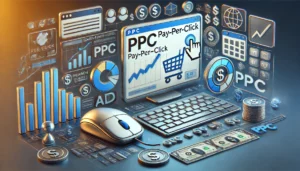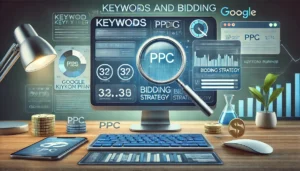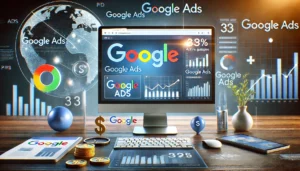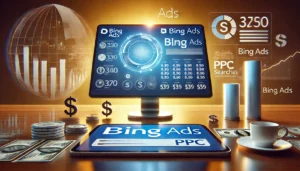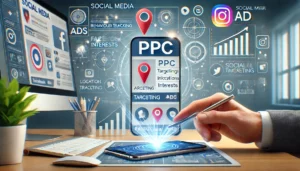PPC Explained: The Comprehensive Guide to Pay-Per-Click Advertising

Pay-Per-Click (PPC) advertising is a powerful tool that businesses use to drive traffic to their websites. By paying each time someone clicks on their ad, companies can quickly reach potential customers who are searching for their products or services. This guide will help you understand the basics of PPC, its key components, and how to set up your own campaign.
Key Takeaways
- PPC advertising helps businesses reach potential customers quickly by paying for each click on their ads.
- Choosing the right keywords and bidding strategy is crucial for a successful PPC campaign.
- Well-crafted ad copy and creative elements can significantly improve the performance of PPC ads.
- Landing pages must be optimised to convert the traffic generated by PPC ads.
- Regular monitoring and optimisation are essential to maintain and improve PPC campaign performance.
Understanding PPC: An Overview
What is PPC?
PPC, or Pay-Per-Click, is a type of digital marketing where advertisers pay a fee each time their ad is clicked. Essentially, it’s a way of buying visits to your site, rather than attempting to earn those visits organically. PPC ads can appear on search engines, social media platforms, and other websites. This model allows businesses to reach specific audiences effectively.
How Does PPC Work?
PPC works by allowing advertisers to bid for ad placement in a search engine’s sponsored links. When someone searches for a keyword related to their business, the ad may appear at the top of the search results. The advertiser pays a small fee each time someone clicks on the ad. This fee is often trivial compared to the value of the visit, making PPC a cost-effective strategy.
Benefits of PPC Advertising
PPC advertising offers several benefits:
- Targeted Reach: You can target specific demographics, locations, and even times of day.
- Measurable Results: PPC campaigns provide detailed analytics, allowing you to track performance and ROI.
- Quick Entry: Unlike SEO, PPC can deliver immediate traffic and results.
PPC is a powerful tool for businesses looking to improve their online presence and drive traffic quickly. It offers a level of control and precision that other forms of advertising can’t match.
By understanding the basics of PPC, we can better appreciate its role in a comprehensive digital marketing strategy.
Key Components of a PPC Campaign
Keywords and Bidding
In any PPC campaign, keywords are the foundation. We need to identify the terms our potential customers are searching for. Using tools like Google Keyword Planner, we can find relevant keywords that are likely to convert. Once we have our keywords, we set bids. This means deciding how much we’re willing to pay for each click. Higher bids can improve ad placement, but we must balance this with our budget.
Ad Copy and Creative
Our ad copy and creative elements are what catch the eye of users. For search ads, compelling text is crucial. It should be relevant to the keywords and enticing enough to make users click. For display ads, visuals play a significant role. We need to create images or videos that stand out and attract attention. Remember, the quality of our ad copy and creative can impact our Quality Score, which in turn affects our ad placement and cost.
Landing Pages
The landing page is where users end up after clicking our ad. It’s essential that this page is relevant to the ad and provides a seamless experience. A well-designed landing page can significantly improve our conversion rates. We should follow best practices, such as having a clear call-to-action and ensuring the page loads quickly. A good landing page not only keeps users engaged but also helps in achieving our campaign goals.
A successful PPC campaign is built on a strong foundation of well-researched keywords, compelling ad copy, and effective landing pages. By focusing on these key components, we can optimise our campaigns for better results.
Setting Up Your First PPC Campaign
Choosing the Right Platform
When starting with PPC, the first step is to choose the right platform. Google AdWords PPC is a popular choice due to its vast reach and user-friendly interface. However, other platforms like Bing Ads and social media PPC options can also be effective. Consider where your target audience spends most of their time online.
Defining Your Goals
Before diving into the technical setup, it’s crucial to define your goals. Are you aiming for more website traffic, increased sales, or better brand awareness? Clear goals will guide your campaign strategy and help you measure success.
Budgeting and Bidding Strategies
Setting a budget is essential for managing your PPC campaign. Decide how much you’re willing to spend daily or monthly. You can also choose between automated and manual bidding strategies. Automated bidding can be a good starting point if you’re new to PPC. Manual bidding allows for more control but requires a deeper understanding of the platform.
Remember, the key to a successful PPC campaign is continuous monitoring and adjustment. Don’t set it and forget it; keep an eye on your metrics and make necessary changes to optimise performance.
Advanced PPC Strategies
Remarketing Techniques
Remarketing is a powerful way to re-engage users who have previously interacted with your site. By targeting these users with specific ads, we can remind them of our products or services, increasing the chances of conversion. For instance, if someone visited our ecommerce PPC site but didn’t make a purchase, we can show them ads featuring the products they viewed. This keeps our brand top of mind and encourages them to return and complete their purchase.
A/B Testing
A/B testing is essential for optimising our PPC campaigns. By creating two versions of an ad and showing them to different segments of our audience, we can determine which version performs better. This helps us refine our ad copy, images, and calls to action. Regular testing ensures that our campaigns remain effective and continue to drive results. It’s a simple yet effective way to maximise our ROI.
Utilising Ad Extensions
Ad extensions enhance our ads by providing additional information and making them more appealing to users. These can include site links, call buttons, or location information. By using ad extensions, we can improve our ad’s visibility and click-through rate. For example, adding a call button to our Google ads PPC can make it easier for potential customers to contact us directly, leading to higher engagement and conversions.
Advanced strategies like remarketing, A/B testing, and ad extensions are crucial for staying ahead in the competitive PPC landscape. They help us fine-tune our campaigns and achieve better results.
PPC for Different Platforms
Google Ads
Google Ads is the most popular PPC platform. It processes over 99,000 search queries every second. This gives us many chances to target the right keywords. However, the competition is high, so we need a bigger budget. Google Ads is great for reaching a large audience.
Bing Ads
Bing Ads is another option. It is the second-largest search engine. Bing Ads can be cheaper than Google Ads. This is good for smaller budgets. But remember, Bing has a smaller audience. We can still reach many people, especially for branded searches.
Social Media PPC
Social media platforms like Facebook and Instagram offer PPC options. These ads blend in with regular posts. We can target users based on their interests, location, and behaviour. This makes social media PPC very effective. We can also use it to grow our social media pages.
Social media PPC is perfect for engaging with users who spend hours on their favourite platforms.
Measuring PPC Success
Key Metrics to Track
Metrics are crucial for understanding the performance of our PPC campaigns. Here are some key metrics we should monitor:
- Clicks: The total number of clicks our ad receives. This is influenced by our keyword selection and the relevance of our ad copy.
- Cost per click (CPC): The price we pay for each click on our ad.
- Clickthrough rate (CTR): The percentage of ad views that result in clicks. This helps determine our CPC.
- Impressions: The number of times our ad is viewed. Cost per mille (CPM) is calculated for every thousand impressions.
- Ad spend: The amount we are spending on our ads. We can optimise this by improving our Quality Score.
- Return on ad spend (ROAS): The ROI of our ad campaign. This metric calculates the revenue received for every dollar spent on ads.
- Conversion rate: The percentage of people that complete the call-to-action on our landing page and become a lead or customer.
- Cost per conversion: The cost to generate a lead. This is calculated as the total cost of an ad divided by the number of conversions.
- Quality Score (QS): Determines ad positioning, so it’s an important metric to keep an eye on.
By paying close attention to each of these metrics, we can increase the ROI of our paid campaign and spend less for better results.
Using Analytics Tools
To measure the success of our PPC campaigns, we need to use analytics tools. These tools help us track and analyse the performance of our ads. Google Analytics and other similar tools provide insights into user behaviour and campaign outcomes. Regular monitoring allows us to make data-driven decisions, like reallocating the budget to high-performing ads or revising ad copy to improve engagement.
Optimising for Better Results
Optimisation is key to improving our PPC campaign performance. We should regularly analyse our campaign’s performance data to understand what’s working and what isn’t. For instance, if certain keywords are draining our budget without conversions, it may be time to pause or adjust them. Or, if we’re ranking for keywords that we don’t want to rank for, we can add them as negative keywords in our campaign.
Active and thoughtful management is crucial for maximising ROI and achieving our marketing objectives.
By consistently analysing and tweaking our campaigns based on performance insights, we can optimise for better results and a higher ROI.
Common PPC Mistakes to Avoid
Ignoring Negative Keywords
One of the biggest mistakes in PPC is ignoring negative keywords. Negative keywords help philtre out irrelevant traffic, ensuring your ads reach the right audience. Without them, you might end up wasting your PPC budget on clicks that don’t convert.
Poor Ad Copy
Ad copy is crucial in PPC campaigns. Poorly written ads fail to attract clicks and conversions. Make sure your ad copy is clear, engaging, and includes a strong call to action. Remember, your ad copy is often the first impression potential customers have of your business.
Not Monitoring Campaigns Regularly
PPC campaigns require constant monitoring and tweaking. Different keywords may become more popular, or competitors may outbid you. If you don’t keep an eye on your campaigns, you could end up spending money without seeing any return.
Regular monitoring allows you to make data-driven decisions, like reallocating the budget to high-performing ads or revising ad copy to improve engagement.
Sending Traffic to Poorly Designed Landing Pages
Why it’s a mistake: Sending traffic to poorly designed landing pages can result in high bounce rates and low conversion rates, wasting your PPC budget. No one wants to click on an ad only to land on a confusing or unattractive page.
Overlooking Mobile Users
Many users access the internet via mobile devices. If your ads and landing pages aren’t optimised for mobile, you could be missing out on a significant portion of potential customers. Ensure your campaigns are mobile-friendly to maximise reach and conversions.
The Role of a PPC Agency
When to Hire a PPC Agency
Knowing when to bring in a PPC agency can be tricky. If your campaigns are not delivering the desired results or you lack the time to manage them, it might be time to consider professional help. A PPC ad agency can provide the expertise and resources needed to optimise your campaigns effectively.
Benefits of Professional Management
Hiring a PPC agency comes with several benefits. They have the experience to manage your campaigns efficiently, ensuring you get the best return on investment. Additionally, they stay updated with the latest trends and technologies, which can be crucial for maintaining a competitive edge. Working with a London PPC agency can also provide local insights that are invaluable for targeting specific demographics.
Choosing the Right Agency
Selecting the right PPC agency is essential for your campaign’s success. Look for agencies with a proven track record and expertise in your industry. For instance, if you are in e-commerce, a PPC ecommerce agency would be ideal. It’s also important to consider their approach to communication and reporting, as transparency is key to a successful partnership.
Partnering with a PPC agency can transform your advertising efforts, making them more efficient and effective. The right agency will not only manage your campaigns but also provide strategic insights to help you achieve your business goals.
Future Trends in PPC Advertising
Automation and AI
Automation and AI are transforming the PPC landscape. Automation helps us manage large datasets and identify trends quickly. AI can predict customer behaviour, making our campaigns more effective. This means we can focus more on strategy and less on manual tasks.
Voice Search
Voice search is becoming more popular. As more people use voice assistants, we need to adapt our PPC strategies. This includes using natural language keywords and optimising for local searches. Voice search can help us reach a broader audience.
Evolving Ad Formats
Ad formats are always changing. New formats like responsive search ads and video ads are gaining traction. These formats offer more flexibility and can improve engagement. Staying updated with these trends ensures our campaigns remain effective.
The PPC landscape is always evolving. Staying updated with the latest trends is crucial for success.
First-Party Data
Due to privacy updates, first-party data is becoming more important. We need to focus on capturing and managing our own data. This will help us maintain targeting accuracy and improve our campaigns.
Diversification
Relying on a single platform can be risky. Diversifying our PPC efforts across multiple platforms can help us stay resilient. This ensures we can adapt to changes and continue to reach our target audience.
Case Studies: Successful PPC Campaigns
E-commerce Success Stories
In the world of e-commerce, PPC campaigns can make or break a business. One of our clients patrol-store, an online retailer, saw a 300% Revenue and Sales increase of 85% after implementing targeted Google Ads campaigns built by the PPC Geeks. By focusing on long-tail keywords and utilising remarketing techniques, we were able to drive highly relevant traffic to their site. This PPC case study highlights the importance of keyword research, audience and advanced knowledge of the Google Ads platform in achieving PPC success.
B2B Campaigns
B2B companies often face unique challenges in PPC advertising. We worked with a software company that needed to generate high-quality leads. Through a combination of LinkedIn Ads and Google Ads, we managed to reduce their cost per lead by 40%. This was achieved by refining their ad copy and focusing on specific job titles and industries. The result was a significant boost in lead quality and quantity.
Local Business Wins
Local businesses can also benefit greatly from PPC. A local plumbing service we assisted saw Lead Volume increase by 266% within the first few months of their campaigns. By targeting local keywords and using Google My Business, we ensured their ads appeared prominently in local search results. This case demonstrates how even small businesses can achieve big results with the right PPC strategy.
PPC campaigns can transform businesses of all sizes. By focusing on the right keywords, platforms, and strategies, we can achieve remarkable results.
PPC Tools and Resources
Navigating the world of PPC can be challenging, but with the right tools and resources, we can make it a lot easier. Here, we’ll explore some of the best tools and resources available to help you manage and optimise your PPC campaigns effectively.
Keyword Research Tools
Finding the right keywords is crucial for any PPC campaign. Tools like SEMRush and Ahrefs can help you discover relevant keywords, manage your lists, and even create negative keyword lists. These tools are essential for ensuring your ads reach the right audience.
Ad Management Software
Managing multiple PPC campaigns can be overwhelming. Software like WordStream and Optmyzr automate many of the tedious tasks involved in setting up and managing your campaigns. These tools offer end-to-end support, from creation to reporting, making your job much easier.
Educational Resources
Staying updated with the latest trends and best practices in PPC is vital. Websites like Search Engine Land and HubSpot offer comprehensive guides and articles on various aspects of PPC. These resources are invaluable for both beginners and experienced marketers.
Pro Tip: Regularly conducting a PPC audit can help identify areas for improvement and ensure your campaigns are running efficiently.
By leveraging these tools and resources, we can significantly improve our PPC management and achieve better results.
Discover the best PPC tools and resources to boost your online campaigns. Our expert team is ready to help you achieve outstanding results. Don’t miss out on our free PPC audit to get started. Visit our website today and take the first step towards optimising your ads.
Conclusion
In conclusion, Pay-Per-Click (PPC) advertising is a powerful tool that can help businesses of all sizes reach their target audience quickly and effectively. By understanding the basics of PPC, such as how the ad auction works and how to choose the right keywords, you can create campaigns that drive traffic to your website and increase conversions. Remember, the key to a successful PPC campaign is continuous monitoring and optimisation. Keep testing different strategies, analysing your results, and making adjustments as needed. With dedication and the right approach, PPC can be a valuable part of your marketing strategy, helping you achieve your business goals.
Frequently Asked Questions
What is PPC?
PPC stands for Pay-Per-Click. It’s a type of online advertising where you pay each time someone clicks on your ad.
How does PPC work?
PPC works by bidding on keywords. When someone searches for those keywords, your ad might show up. If they click on your ad, you pay the bid amount.
What are the benefits of PPC?
The benefits of PPC include quick visibility, targeted audience reach, measurable results, and flexibility in budget.
How do I choose the right keywords for my PPC campaign?
To choose the right keywords, think about what your customers might search for. Use keyword research tools to find popular and relevant keywords.
What is a landing page in PPC?
A landing page is the webpage where users land after clicking on your ad. It should be relevant to the ad and encourage users to take action.
What is remarketing in PPC?
Remarketing is a strategy where you target people who have already visited your website. It helps in bringing them back to complete a purchase or take another action.
How do I measure the success of my PPC campaign?
You can measure the success of your PPC campaign by tracking metrics like click-through rate (CTR), conversion rate, and return on investment (ROI).
What are negative keywords in PPC?
Negative keywords are terms you don’t want your ads to show up for. They help in filtering out irrelevant traffic and save your budget.
Author
Search Blog
Free PPC Audit
Subscribe to our Newsletter
The Voices of Our Success: Your Words, Our Pride
Don't just take our word for it. With over 100+ five-star reviews, we let our work-and our satisfied clients-speak for us.
"We have been working with PPC Geeks for around 6 months and have found Mark and the team to be very impressive. Having worked with a few companies in this and similar sectors, I rate PPC Geeks as the strongest I have come across. They have taken time to understand our business, our market and competitors and supported us to devise a strategy to generate business. I value the expertise Mark and his team provide and trust them to make the best recommendations for the long-term."
~ Just Go, Alasdair Anderson

